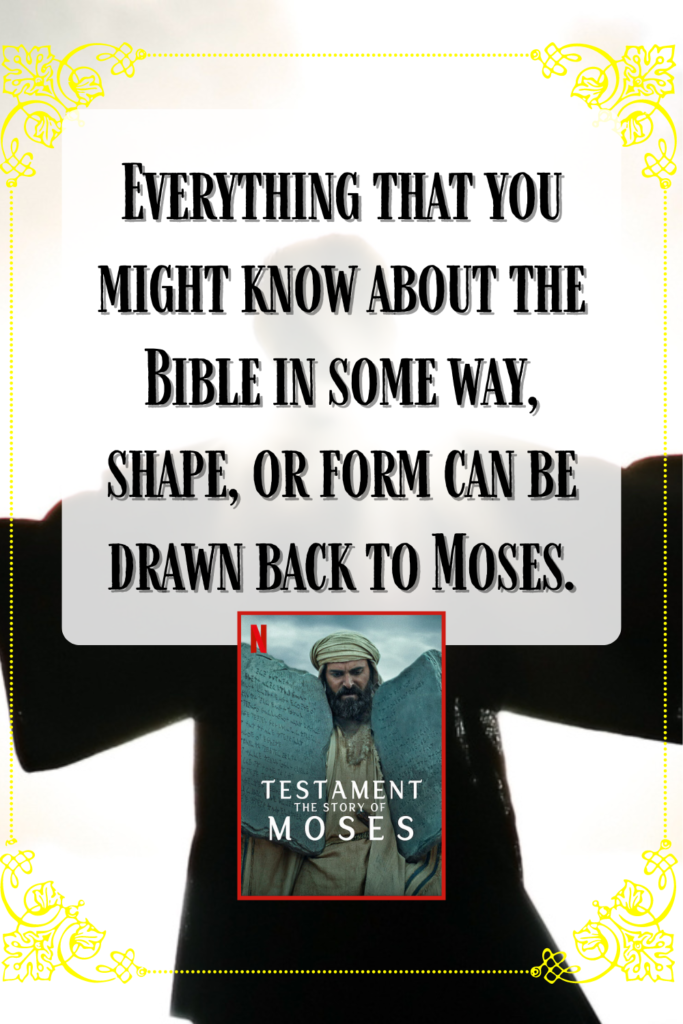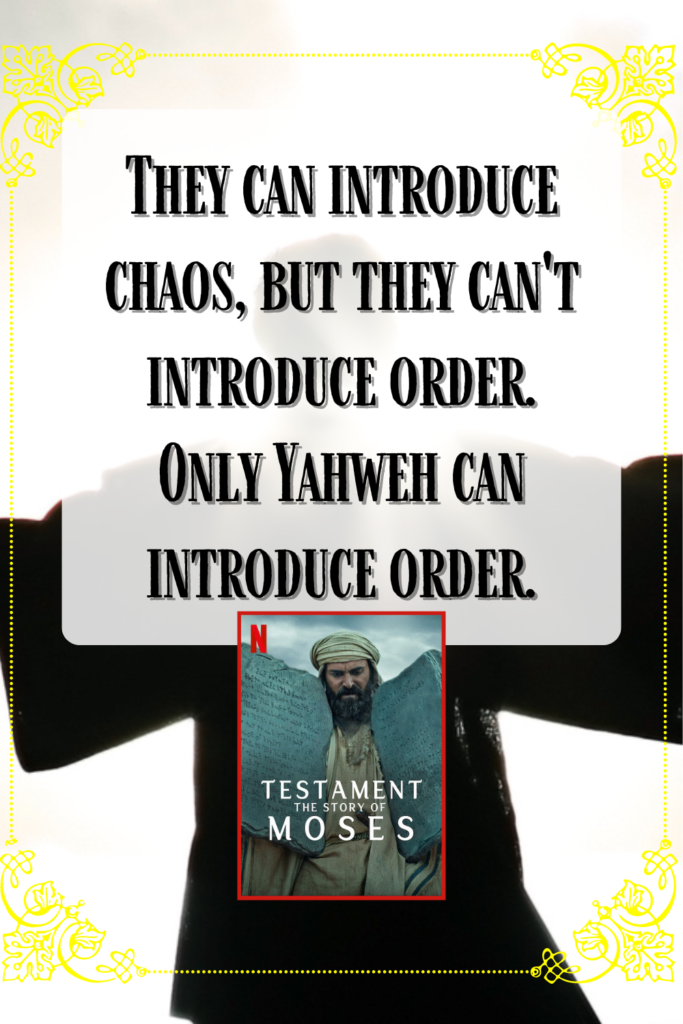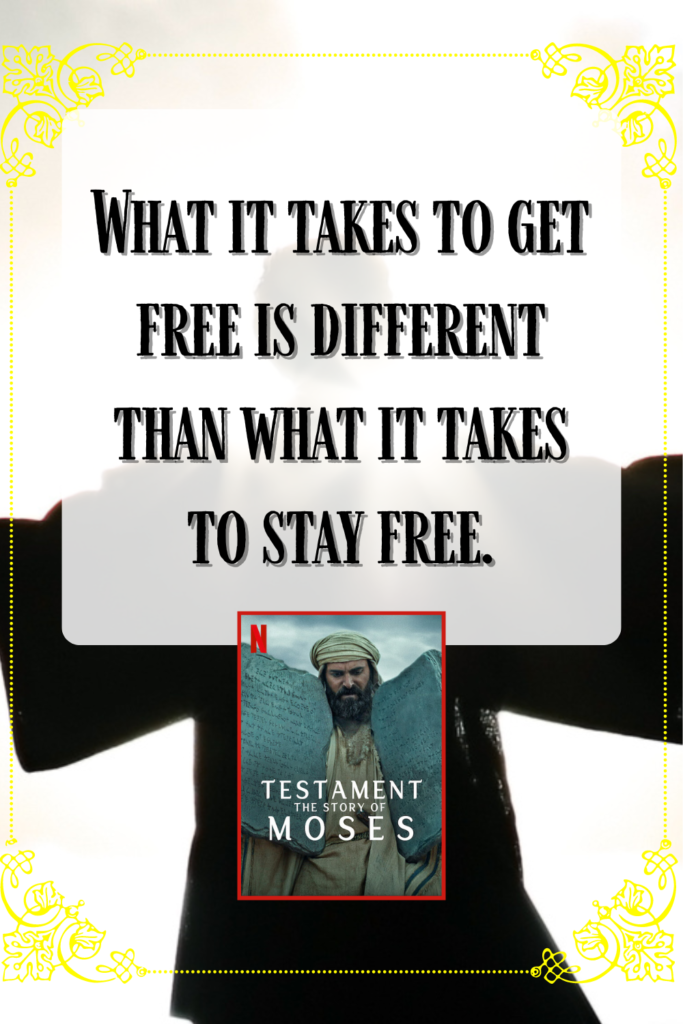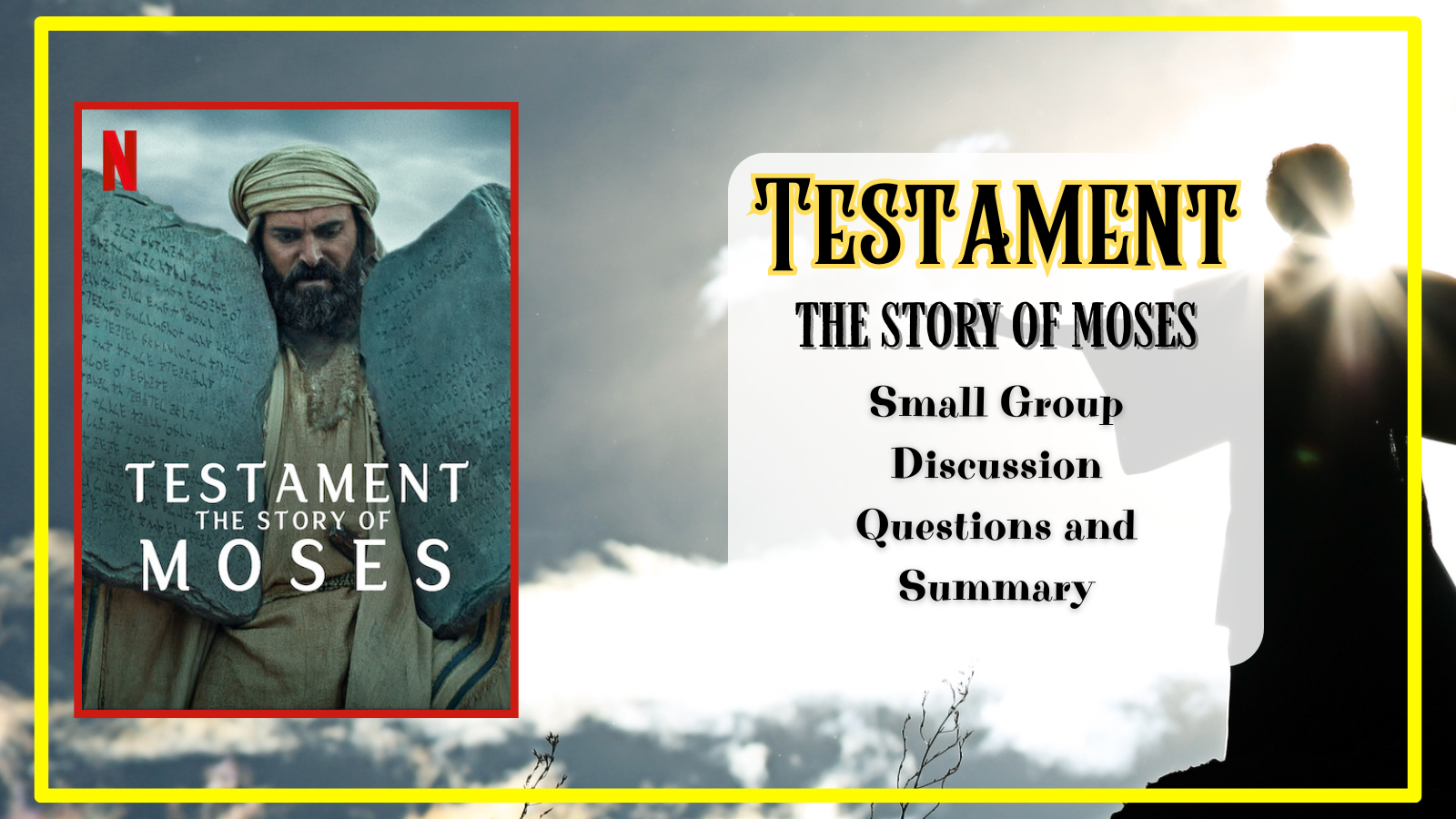Testament Small Group Questions by the Ent. This post contains affiliate links, you can find out more on our policies page or in the disclaimer at the bottom of the blog.
Know Before You Watch
Title: Testament: The Story of Moses
Rating: Not Rated. We’d suggest TV-14ish (See Warning section below)
Genre: Documentary, Religious
Age suggested: 12 and up
Release Date: March 27th, 2024
Warnings: Murder, Death, Depictions of slavery, and Mild violence
Quick Testament Documentary Summary
Testament: The Story of Moses blends a reenactment and documentary style to put forth the story of Moses, an important figure in the Jewish, Christian, and Muslim traditions. The reenactment has a narrator that reads out passages while scenes play out as normal. The documentary portions interview various experts with many different experiences and beliefs to tell the overall story of Moses within the culture of his time.
Related Content: Chosen Season 4 Small Group Discussion Questions
Part One: The Prophet
Testament Episode One Summary
Episode One (The Prophet) begins the journey of Moses. This starts with his birth and the conditions of the land at this time. It jumps pretty quick to an older Moses and jumps to his murder of an Israelite. This leads to him leaving the Pharaoh’s palace and becoming a lowly shepherd, but also starting his own family.
Things turn sideways when Moses hears the voice of God from a burning bush and guides him to lead his people out of Egypt. He connects with his brother Aaron and the rest of his birth family. The ending of the episode finds Moses returning the Pharaoh’s palace as he begins the process of asking for his people’s freedom
The documentary portion of this episode dives into the culture of Moses’ time, especially the condition of Israel during Moses’ birth. This episode also starts discussing the cultural tension of the God of Moses and the many Egyptian gods. This will become a much more important factor in the next episode.
The Prophet – Testament Small Group Discussion Guide
- How did this episode differ than what you have read and what were the main similarities?
- What causes Moses to leave Egypt and how did his life change afterwards?
- What was the significance of names in this episode (i.e. Moses, Gershom, etc)?
- Why do you think Moses felt he couldn’t speak to Pharaoh himself?
- Have you ever thought about the dynamic of Moses’ adopted parent and bio parent still speaking into his life?
Main Religious Texts for Part One: The Prophet
–Bible: Exodus Ch 1-5
–Torah: Book of Shemot (Exodus) – Ch 1 (‘א)-Ch 5 (‘ה)
–Qur’an: Qur’an 28:1-43
You can purchase your own Bible, Torah, or the Qur’an!
Related Content: Hard Questions from the Cabrini Movie

Testament Episode One Quotes
The bible speaks of a lowly shepherd called to a mysterious mountain somewhere in the Sinai Peninsula.
So much of the Judeo-Christian religion rides on Moses. He’s a founding father. Everything that you might know about the Bible in some way, shape, or form can be drawn back to Moses. His life and his ministry.
Moses in unique in the Judeo-Christian-Islamic tradition in that he appears in all three. He’s accorded honor as a prophet in all three.
Social justice began with Moses.
Never lose sight of you are. You are as royal as anyone.
He goes from being a prince of Egypt to being a shepherd.
I think God calls us in a variety of ways. Sometimes our call is the result of struggle. But sometimes our call is a rejection of the comfort and the convenience we have so come to enjoy.
And his failures teach us as much as his achievements.
What kind of name is that? It’s a name that’s a verb. God is a verb.
Part Two: The Plagues
Testament Episode Two Summary
As the title implies, this episode heavily focuses on the plagues. From the transformation from rod to snake to the darkness that crosses the land (The killing of the firstborn occurs in episode three), God continues to place hardships on Pharaoh and his people. Each plague continues to show just how truly powerless the regime of Pharaoh actually was.
The really fascinating aspect of this episode was how many of the plagues were a direct calling out of different Egyptian gods. In the documentary portion, it is stated that “The story He’s (God) telling them is the total dismantling of what we believe is the source of power.” This is done with the Egyptian gods, the magicians, and eventually Pharaoh himself.
The Plagues – Testament Small Group Discussion Guide
- How did this episode differ than what you have read and what were the main similarities?
- Have you ever made the connection between the plagues and the gods they were mimicking?
- Did this episode depict the plagues in a different way than you had seen or thought of before. If so, what were the differences?
- How can you see the plagues as a battle between the God of Moses and the gods of Egypt?
- What do you think happens when Pharaoh’s heart is hardened? Have you ever seen this happen to anyone in your own life?
Main Religious Texts for Part Two: The Plague
–Bible: Exodus Ch 6-10
–Torah: Book of Shemot (Exodus) – Ch 6 (‘ו)-Ch 10 (‘י)
–Qur’an: Qur’an 7:103-136
You can purchase your own Bible, Torah, or the Qur’an!
Continue reading for more of our Testament Small Group Discussion Questions

Testament Episode Two Quotes
Will they serve Pharaoh as slaves or will they serve Yahweh as worshippers?
The most precious thing thing in the world is a man’s freedom.
They can introduce chaos, but they can’t introduce order. Only Yahweh can introduce order.
I love you, my brother. I ask you to heed him.
The story He’s [God] telling them is the total dismantling of what we believe is the source of power.
I will be diminished if I bow to the God of Moses.
The power you yield is great. Do not let it harden you too.
Part Three: The Promised Land
Testament Episode Three Summary
The Promised Land episode kicks off pretty brutally as the last plague occurs and all the firstborn sons of Egypt are killed, including Pharaoh’s own child. This finally pushes Pharaoh to allow the Israelites to leave. After he decrees this though, he takes it back and pursues the escaping Israelites with an army. This is where the miracle of crossing the seas occurs and Moses leads the Israelites to safety.
As is prone to happen so often with humans, joy turns to sourness as the people get hungry and begin to long for their days of slavery. God provides for them on a daily basis as the trek closer and closer to the promised land.
The Promised Land – Testament Small Group Discussion Guide
- How did this episode differ than what you have read and what were the main similarities?
- What finally convinces Pharaoh to free the Israelites and what makes him change his mind yet again?
- How does the story of the Israelites reflect the modern day’s lack of trust in God?
- What is the significance of the fact that Pharaoh’s daughter follow Moses rather than Pharaoh?
- Ultimately, why do you think Moses wasn’t allowed to enter the promised land?
Main Religious Texts for Part Three: The Promised Land
–Bible: Exodus Ch 11-20; Deuteronomy 34
–Torah: Book of Shemot (Exodus) – Ch 11 (י’א)-Ch 20 (‘כ); Book of D’varim (DEuteronomy) Ch 34 (ל’ד)
–Qur’an: Qur’an 7:103-136
You can purchase your own Bible, Torah, or the Qur’an!

Testament Episode Three Quotes
Ancient rabbinic tradition does not celebrate the suffering that the plagues deliver to the people of Egypt.
I think redactors and biblical authors have substituted a death angel to absolve God from some of the more fierce and some of the more vengeful character that would be associated with any god who would take the lives of children and the lives of the innocent.
One of the ways to undercut and to heal from Stockholm Syndrome is the minimization of the captor.
As long as humans can learn to stick together and to work with each other, that’s what God’s waiting for.
This is the first important theological message of Jewish, Christian, Muslim tradition. And it comes attributed to the mouth of a woman.
When God saves, creation gets involved.
The goal of the Exodus story is not “Be free.” It’s “Go to the mountain to worship God. Get the commandments to get the law so you know how to act and you know how to worship.
They still have the spiritual struggle to endure. Even though they’ve been politically liberated, they still have the task of being spiritually liberated.
When you don’t know how you’re gonna survive tomorrow, that’s when you can do a lot of bad stuff [paraphrased].
To change days past, one needs forgiveness, remember?
What really alienated the children of Israel in the wilderness was the lack of covenant.
What it takes to get free is different than what it takes to stay free.
Final Thoughts on Testament: The Story of Moses
Ultimately, I feel that this Testament series was well intentioned and does have some powerful moments, but does fall flat in a few different ways. Mainly for me was the split between documentary and regular movie filming. To me, I think it would have been best to either just be a (shorter) documentary with maybe some illustrations or just a full acted out story (similar to the style of The Chosen). The style they chose simply grinded many of the more dramatic moments to a halt or just simply didn’t give them room to grow to begin with.
The filmography was well done and the creators hit the major moments of the life of Moses. So, if there is someone who was unfamiliar with this story, this may be a good intro. If nothing else, the representation of this movie was well done and represented many of the people correctly for the culture and time they were in. I think this whole series is best used as a small group setting, especially for groups newer to the faith. The documentary portions definitely leave some moments for questioning and discussions.
Thanks for reading our Testament Small Group Questions.
Down The Hobbit Hole Blog and this Testament Small Group Questions use affiliate links. We only link products we think you’ll like and you are never charged extra for them. As Amazon Associates, we earn from qualifying purchases at no additional cost to you. All images used in this post were either original designs from Canva or used from media kits We also use cookies to gather analytics and present advertisements. Find our other reviews with discussion questions here. And our posts about family stuff here.
